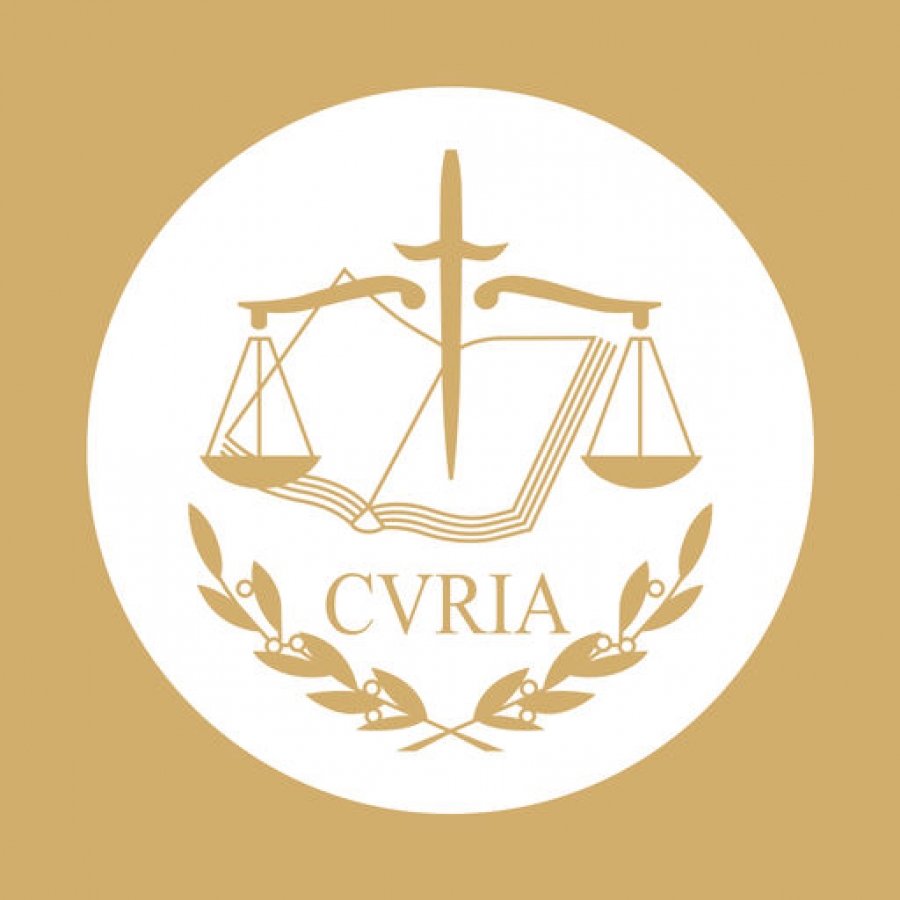Court of Justice
Tuesday 29th May
Judgment in Case C-426/16 Liga van Moskeeën en Islamitische Organisaties Provincie Antwerpen & others
Slaughter of unstunned animals for the purpose of the annual Festival of Sacrifice of Muslims in BelgiumThere will be a press release for this judgmentBelieving Muslims regard it as their religious duty on the first day of their annual Islamic Festival of Sacrifice to slaughter (or to have slaughtered) an animal, mainly a sheep.
Under un EU Regulation (1099/2009), animals may only be slaughtered after having been stunned with an exception being however applied to special slaughter methods required by religious rites, provided that the slaughter of unstunned animals takes place at an appropriate slaughterhouse designated to this end.
As during the Festival of Sacrifice the capacity of designated slaughterhouses in Flanders is always lagging behind the demand for meat from sheep slaughtered according to Muslim religious rites, many from the local Muslim community are unable to observe the religious duty at issue.
For this reason, the organisations of Muslims in Flanders brought lawsuits against the Flemish authorities, which are responsible in Flanders for the execution of the EU Regulation. The Belgian Court hearing the matter has asked the Court of Justice if – having regard to the circumstances of the case and, especially, to the fact that the construction of new appropriate slaughterhouses would be disproportionately expensive – the Regulation breaches the principle of freedom of religion enshrined in the Charter of Fundamental Rights of the EU.Background documents Tuesday 29th May
Opinion in Case C-21/17 Catlin Europe
Service of a European order for payment There will be a summary for this OpinionAt the request of a Czech company, the Okresní soud Praha – západ issued a European order for payment against a German company. This order, together with a copy of the form by which the Czech company applied for issuance of the order, was served on the German company according to the EU Regulation governing the procedure for issuing a European order for payment (Regulation 1896/2006/EC).
The order was issued and served in German, whilst the application form of the Czech company, the service of which is also required by the Regulation, in Czech. Although the Regulation does not provide rules as to the language in which the form in question should be served, the German company claims that, under the EU Regulation on the service of documents (Regulation 1393/2007/EC), it should have been informed that, by virtue of this latter Regulation, it was entitled to refuse to accept the form it was sent on the ground that that form had not been written in German. By reason of this alleged failure, the German company, against which in the meantime legal proceedings were instituted before the Czech Courts, claims to be entitled for an exceptional review of the European order for payment despite the fact that the ordinary deadline for submitting an opposition to the order has already expired.
The Nejvyšší soud hearing the matter has asked the Court of Justice if the failure to inform the German company of the possibility to refuse acceptance of the form at issue should result in its being entitled to ask for a review of the European order for payment.Background documentsTuesday 29th May
Opinion in Case C-287/17 Česká pojišťovna
Compensation for recovery costs of sums affected by late payment in commercial transactionsThere will be a summary for this OpinionThe Directive on combating late payment in commercial transactions (2011/7/EU) provides that, in cases where interest for late payment becomes payable, the creditor is entitled to obtain from the debtor, as a minimum, a fixed sum of €40 as compensation for his own recovery costs.
The question to which the Court of Justice should give an answer in the present case, in which Česká pojišťovna seeks compensation for late payment by one of its corporate clients, is whether the mentioned sum of €40 also includes compensation for costs of sending a reminder to the client prior to bringing an action against it before the Courts, or, on the contrary, the latter compensation can also be requested separately in addition to claiming payment of the sum in question.Background documentsThursday 31st May
Judgment in Case C-537/17 Wegener
Applicability of the Airline Passenger Compensation Regulation to flights operated outside the EUThere will be a press release for this judgmentClaudia Wegener, a German national, had a confirmed reservation for two flights that were provided by Royal Air Maroc, a Moroccan air carrier. In Casablanca, where she arrived from Berlin with the first flight, she was denied boarding for the second flight, which was to Agadir, on the ground that her seat had been given to another person. As a result of the boarding denied, she arrived in Agadir with a delay of four hours.
She brought an action before the German courts in order to obtain compensation, under the EU Airline Passenger Compensation Regulation (261/2004/EC), from Royal Air Maroc for a significant delay in arrival.
The German court hearing the matter asks the Court of Justice whether the flights concerned could be viewed as a single flight departing from the EU to which the regulation therefore applies or, on the contrary, they should be regarded, also from a legal point of view, as separate flights with the consequence of the Casablanca-Agadir flight, as a flight entirely operated outside the EU, not falling within the scope of the regulation.Background documentsThursday 31st May
Judgment in Case C-68/17 IR
Dismissal from a Catholic clinic of a remarried doctor for not respecting ethics of the Catholic ChurchThere will be a press release for this judgmentFrom 2000 to 2009, JQ, a Catholic, was the head of the internal medicine department of a Catholic hospital located in Düsseldorf, Germany. This hospital is run by IR, a German limited liability company controlled by the Catholic Archbishop of Cologne. Finding out that JQ had remarried civilly after divorcing his first wife in accordance with German civil law, IR terminated his employment contract because his first marriage, concluded under the Catholic rite, had not been annulled.
According to IR, by concluding an invalid marriage under canon law, JQ has failed to meet his obligations under the employment relationship. In fact, the conclusion of such a marriage is considered a serious violation of the obligations of loyalty to the Catholic rules, which would justify the dismissal of JQ in this case.
JQ, meanwhile, considers that his dismissal violates the principle of equal treatment since the divorce and remarriage of a Protestant or non-religious leader of service would not have any consequence on his working relationship with IR.
Seized of the dispute, the German Federal Labour Court has questioned the Court of Justice whether the German conception of the right to ecclesial self-determination, which allows the Catholic Church to demand from its employees a different loyalty according to their confession, is in conformity with EU law and, more specifically, with the prohibition of any discrimination on grounds of religion, regulated particularly by the Directive on equal treatment in employment (2000/78/EK).Background documentsThursday 31st May (9 am)
Judgment in Case C-335/17 ValchevaGrandparents’ right of access to grandchildren in case of divorce of parentsThere will be a press release for this judgmentNeli Valcheva, a Bulgarian national, has a minor grandson who was born from the marriage of her daughter, a Bulgarian national as well, to a Greek national. The marriage was dissolved by a Greek court and the custody rights over the child were awarded to the father with a right to access to the child for the mother.
The grandmother brought an action before the Bulgarian courts in order to obtain the right to access to her grandson.
Seized of the dispute, the Supreme Court of Cassation of Bulgaria has asked the Court of Justice if “the right of access” as defined in a Council regulation regarding matrimonial matters and parental responsibility (2201/2003/EC) comprises not only the access between the parents and the child, but also the child’s access to other relatives, namely the grandparents.Background documentsFriday 1st June
Hearing in Case C-216/18 PPU Minister for Justice and EqualityState of rule of law in PolandAn Irish court which is to decide on the execution of a European arrest warrant issued by a Polish court has asked the Court of Justice whether the circumstance that, in the Irish court’s opinion, the Polish judicial system is currently not working in accordance with the principle of rule of law, has an impact on whether the arrest warrant can be executed.Background documents
Judgment in Case C-673/16 Coman & others
Free movement and stay of a non-EU citizen same sex spouse of an EU citizenThere will be a press release for this judgmentMr Coman – a Romanian citizen – and Mr Hamilton – an American national – contracted a marriage in Brussels in 2010. As they considered moving one day to Romania, Mr Coman requested at the Romanian Embassy in Belgium transcription of the Belgian marriage certificate. This was rejected by the Romanian Consular Authority because Romanian law does not recognise marriages between same sex persons. As the refusal of recognition of their marriage results in Mr Hamilton not having a right to stay in Romania, Mr Coman has brought legal proceedings before the Romanian Courts invoking that the Romanian authorities’ acting prevents him from practicing his right to freely choose with his closest family members his place of residence within the EU.
The Constitutional Court of Romania has asked the Court of Justice whether a Member State which does not make it possible for homosexual persons to contract a marriage can refuse grant of a right to permanent stay to a non-EU citizen same sex spouse of an EU citizen.Background documents
Tuesday 5th June
Judgment in Case C-210/16 Wirtschaftsakademie Schleswig-Holstein
Liability of advertisers on Facebook for breach of data protection rules by FacebookThere will be a press release for this judgmentThe Wirtschaftsakademie Schleswig-Holstein, a German company specialised in providing educational services, set up a Facebook fun page in order to advertise its educational programmes. The operators of such fan pages can receive anonymous statistical information about users via the ‘Facebook Insights’ provided by Facebook. The statistics are gathered when the fan page is accessed via Facebook by storing at least one cookie on the user’s hard drive. In the case at hand, neither the Wirtschaftsakademie nor Facebook informed users of the storage and function of this cookie or the subsequent data processing.
The German data protection authorities launched an investigation into whether the aforementioned practice was in line with EU and German data protection rules, as a result of which they ordered the Wirtschaftsakademie to deactivate its Facebook fun page. However, the German company asserts before the German Courts, before which the data protection authority’s decision was challenged, that it cannot be held liable for infringements committed by Facebook. Facebook, which participates in those court proceedings as an intervener supporting the Wirtschaftsakademie, invoked, on the one hand, that, since its European headquarters are located in Ireland, the legality of its data treatment activity can only be reviewed by the Irish rather than the German data protection authorities and, on the other hand, that its data treatment activity is compatible with Irish law.
The German Federal Administrative Court hearing the matter has asked the Court of Justice if, in light of EU data protection rules, a company operating a Facebook fun page can be held liable for Facebook having stored on the computers of this page’s users a cookie without these users having previously been informed of this practice. The German Court also wishes to know whether the German data protection authorities are entitled, and if so to which extent, to investigate whether Facebook’s Irish daughter respects EU data protection rules. In this regard, the Federal Administrative Court emphasises that Facebook also has a daughter company in Germany, which, however, is only engaged in marketing of Facebook’s services without having any influence on Facebook Group’s data treatment policy, which, in Europe, is directed from Ireland.Background documents
Thursday 7th JuneJudgment in Case C-44/17 The Scotch Whisky Association
Use of the denomination “Glen” on the labelling of whisky produced outside ScotlandThere will be a press release for this judgmentA trader markets a whisky produced by a distillery located in Berglen, a town situated in the Buchenbach Valley in Southern Germany, under the name “Glen Buchenbach”. The information appearing on the labelling of the bottle containing this whisky clearly indicates that the whisky originates from Germany.
The Scotch Whisky Association, which represents the interests of the Scottish whisky industry, claims that the use of the denomination “Glen”, which in Gaelic means narrow valley, for a German whisky is likely to mislead consumers as this denomination is traditionally employed by a large number of Scottish whisky producers together with the name of the “Glen” corresponding to the place of manufacturing of their respective whisky. In addition, the Association is of the view that, because of this risk of misleading, the integrity of the registered geographical indication “Scotch Whisky” is also impaired and, for this reason, has asked the German Courts to prohibit the trader in question to use the denomination “Glen Buchenbach” for the purpose of the marketing of the German whisky at issue.The German Court dealing with the case has asked the Court of Justice to give it instructions as to the settling of this dispute.Background documentsGeneral CourtAn appeal may be brought before the Court of Justice against the decisions of the General Court
Thursday 31st MayJudgment in Case T-770/16 & T-352/17 Korwin-Mikke v European Parliament
Sanctions on a Polish Member of the European ParliamentThere will be a press release for this judgmentJanusz Korwin-Mikke, a Member of the European Parliament, was the subject of various disciplinary sanctions imposed by the European Parliament because of his plenary speeches that undermined the dignity and values of Parliament. In these speeches, Mr Korwin-Mikke used injurious and degrading expressions against people of African origin and women.
The penalties were as follows: the loss of the right to the residence allowance for a period of thirty days, the temporary suspension of his participation in all activities of the Parliament for a period of ten days and the prohibition to represent the Parliament for a period of one year.
Mr Korwin-Mikke has brought actions in order to obtain the annulment of those penalties and the reparation for the financial and moral damage caused by the Parliament’s decisions saying that they are disproportionate to the aim pursued and that they violate the freedom of expression guaranteed by the Charter of Fundamental Rights of the European Union. According to Mr Korwin-Mikke, the limitations of the freedom of expression in political speeches of elected persons are admitted only in exceptional cases. In addition, he considers that the penalty provided for by Article 166 of the Rules of Procedure of Parliament is for the parliamentarians who disturb the debates, but the Parliament has not demonstrated how his remarks have disturbed them.
The Parliament considers that, in accordance with the same Rules of Procedure, there is a certain margin of appreciation in applying disciplinary sanctions. In addition, the right to freedom of expression is not applicable to the use of insulting, abusive or disrespectful language, or to behaviour that undermines the dignity and values of Parliament.Background documents (T-770/16)
Background documents (T-352/17)





